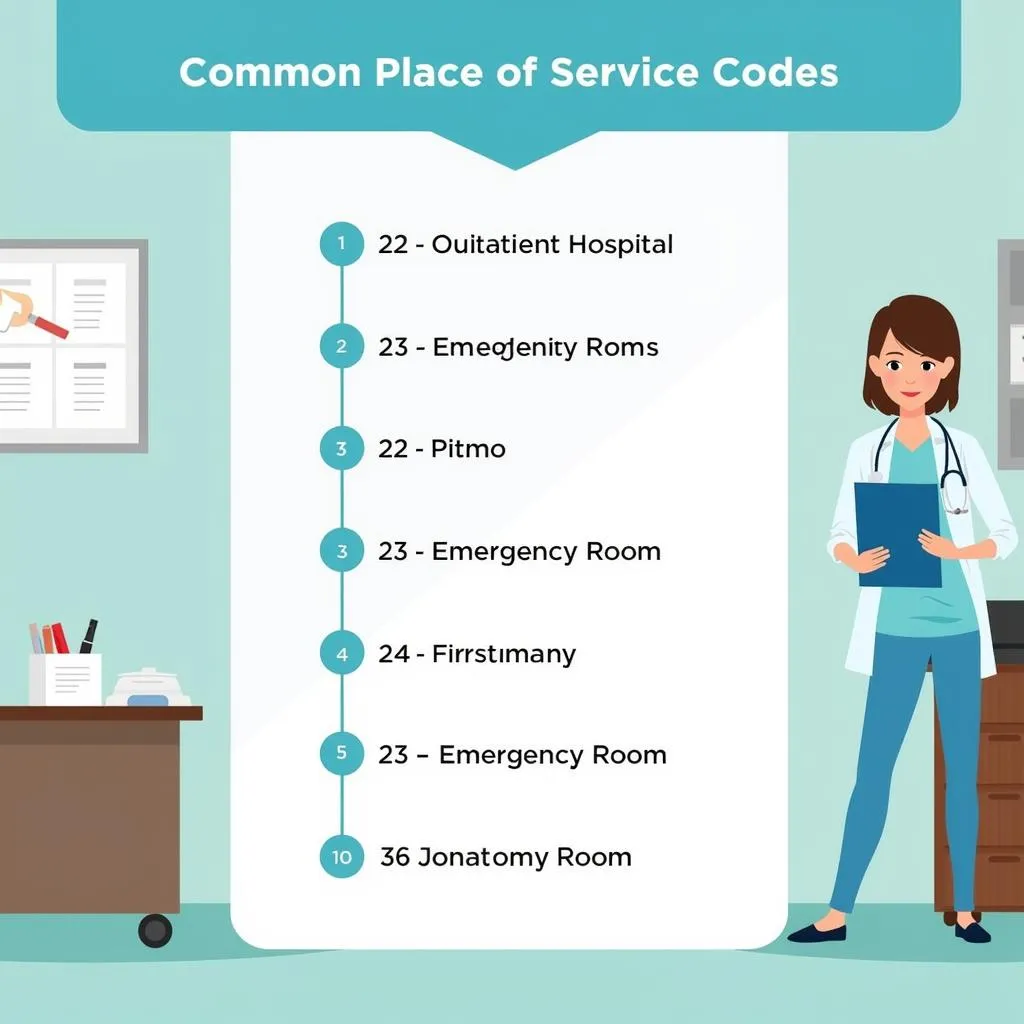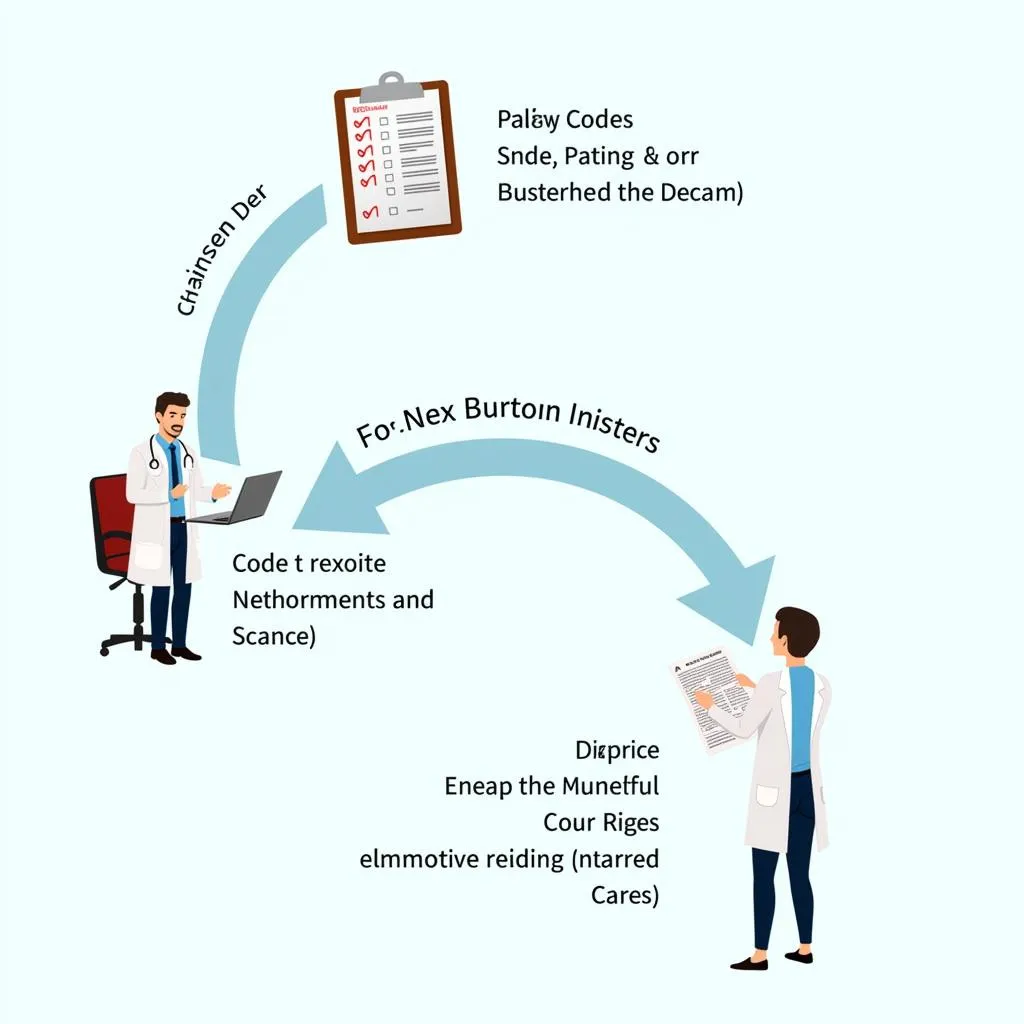Place of service codes, often abbreviated as POS codes, play a crucial role in the healthcare billing process, especially for hospitals. These codes provide specific information about the location where a patient receives medical services. Accurate use of POS codes ensures correct billing, facilitates efficient claims processing, and helps hospitals receive appropriate reimbursement for the services they provide.
What are Place of Service Codes?
Place of service codes are two-digit numerical codes used on medical claims to identify the setting where a healthcare service was provided. These codes help insurance companies determine the appropriate reimbursement rates for services, as the cost of care can vary significantly depending on the location. For example, a procedure performed in a hospital outpatient department will typically have a different reimbursement rate than the same procedure performed in a physician’s office.
 Hospital Place of Service Codes
Hospital Place of Service Codes
Why are Place of Service Codes Important for Hospitals?
Accurate use of POS codes is critical for hospitals for several reasons:
- Revenue Cycle Management: Correct POS codes are essential for proper claim submission and reimbursement. Inaccurate or missing codes can lead to claim denials, delays in payment, and lost revenue for the hospital.
- Compliance: Using the wrong POS code can be considered fraudulent billing, even if the error is unintentional. Hospitals must prioritize compliance with billing regulations to avoid potential audits and penalties.
- Data Analysis: POS codes provide valuable data that hospitals can use to track patient volume, analyze service utilization patterns, and identify areas for improvement in operational efficiency and resource allocation.
Common Place of Service Codes Used by Hospitals
While there are numerous POS codes, some are used more frequently by hospitals:
- 21 – Inpatient Hospital: This code signifies services provided to patients admitted to the hospital for an overnight stay or longer.
- 22 – Outpatient Hospital: This code applies to services rendered to patients who are not admitted to the hospital overnight. This could include services in emergency rooms, observation units, or hospital-based clinics.
- 23 – Emergency Room: This code specifically identifies services provided in a hospital’s emergency department.
 Hospital Billing Codes and Medical Records
Hospital Billing Codes and Medical Records
How Hospitals Can Ensure Accurate POS Code Assignment
Hospitals can implement several strategies to enhance the accuracy of POS code assignment:
- Staff Training: Regular training programs for billing and coding staff are essential to ensure they stay updated on coding guidelines and regulations.
- Electronic Health Records (EHR) Integration: Integrating POS code selection tools within EHR systems can minimize manual errors and improve coding accuracy.
- Regular Audits: Conducting internal audits of medical records and billing claims can help hospitals identify and rectify coding errors, reducing the risk of claim denials.
What is a PSA in a Hospital?
While similar in concept to POS codes, a PSA in a hospital context usually refers to a “Public Service Announcement.” PSAs are messages disseminated by hospitals to raise awareness about important health topics, promote community health initiatives, or provide information about the hospital’s services.
FAQs about Place of Service Codes
Q: Can a hospital have multiple POS codes?
A: Yes, hospitals often utilize various POS codes depending on the location and type of services provided within the facility.
Q: Who is responsible for assigning POS codes?
A: While physicians or other healthcare providers typically document the location of service, trained medical coders usually assign the specific POS code based on documentation in the medical record.
Q: Where can I find the complete list of POS codes?
A: The Centers for Medicare & Medicaid Services (CMS) website provides a comprehensive list of POS codes and their descriptions.
Conclusion
Place of service codes are a critical aspect of the healthcare billing process for hospitals. Understanding and correctly using these codes is essential for accurate billing, timely reimbursements, and compliance with regulations. By prioritizing staff training, leveraging technology, and implementing robust auditing processes, hospitals can optimize their POS code assignment practices and ensure the financial health of their institutions.
For any assistance with healthcare services or for more information, please contact us at Phone Number: 02437655121, Email: [email protected] or visit us at: No. 298 Cau Dien Street, Minh Khai Ward, Bac Tu Liem District, Hanoi, Vietnam. We have a dedicated customer service team available 24/7.